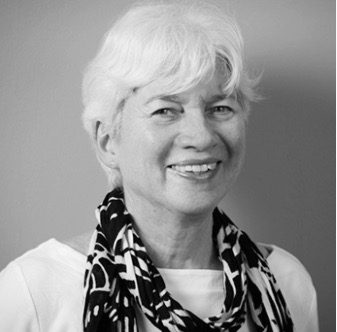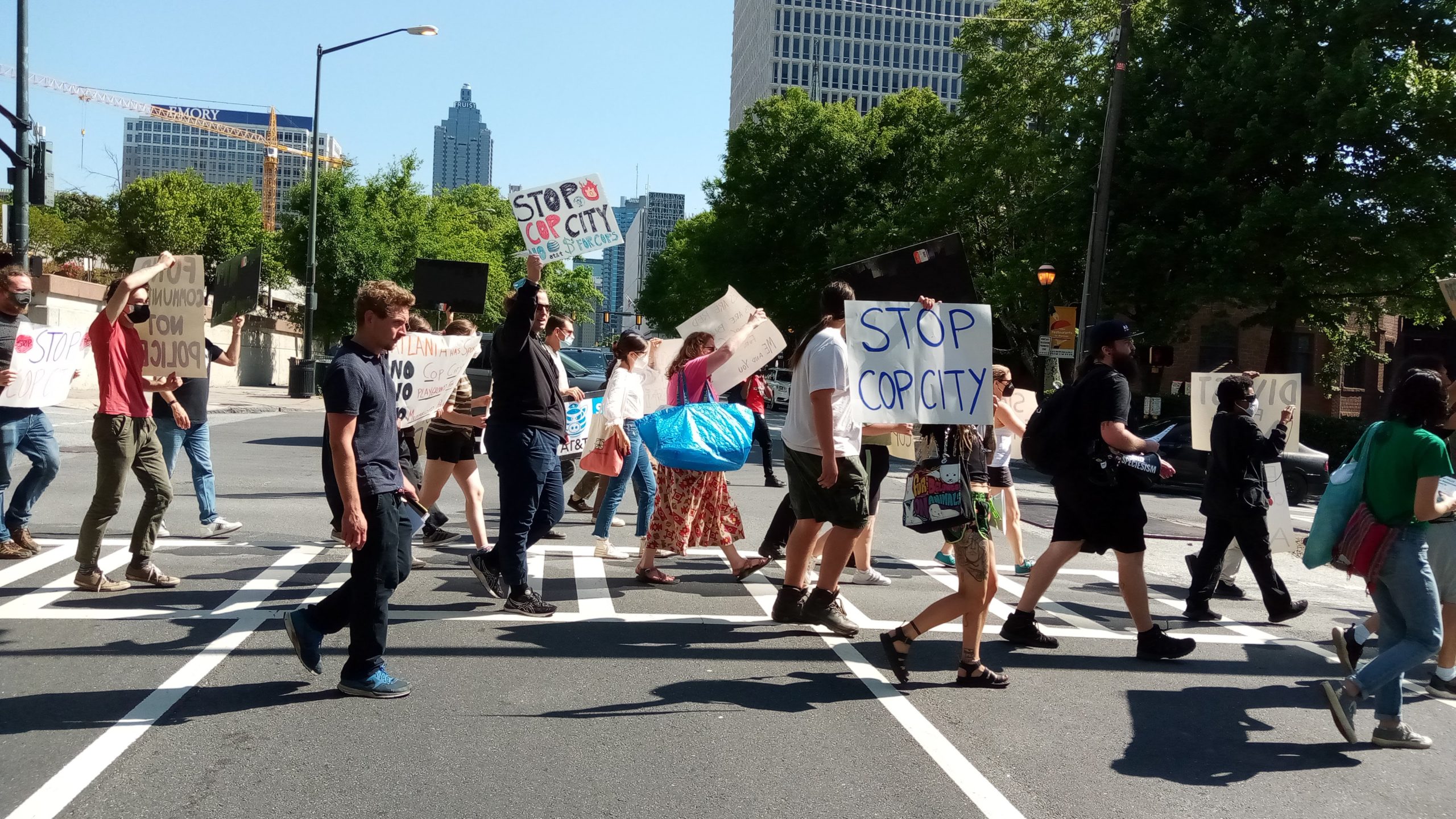This article first appeared in Political Peach News
The growing tensions around the planned Atlanta police training facility have sadly escalated resulting in the death of a protestor, the wounding of a state patrolman, and property damage in downtown Atlanta. This facility has been labeled cop city (and is used here) because plans include a mock city and other features for training on urban policing techniques. But is it possible for a city like Atlanta to have a well-trained police force that meets the needs of a diverse, progressive city while avoiding overly-aggressive police tactics and militarization, and also protects and grows our green space and tree canopy?
The hard truth is the location of a police training facility in the preserved South River Forest is a plan that should have never gone forward. Its approval was marked by a stunning lack of examination, transparency, and citizen input. Hard questions went without being answered or even raised. The idea was apparently conceived of and pushed forward by the powerful Atlanta Police Foundation, and cheered on and patially financed by the business community in response to fear of both rising crime and the threat of Buckhead to exit the city of Atlanta.
What Training Do Police Need?
The idea that the Atlanta police department suddenly needed a new $90 million training facility emerged out of two major, but conflicting public concerns: the protests against the 2020 murder of George Floyd, (and indeed a long history of police misconduct resulting in calls to defund the police); and the aforementioned perception of rising crime and the threat of Buckhead secession. These two streams could not have been more diametrically opposed.
The role of policing in the United States is historically rooted in race and class struggles. The calls to “defund the police” gained attention during the summer of 2020 but were largely misunderstood. The Brookings Institute, in May 2021 (just as Atlanta’s training facility was being publicized) published “Seven Myths about ‘Defund the Police’ Debunked,” arguing that the adverse reaction to this idea was based more on fear than on facts. The authors conclude, “…research supports a public health approach to policing. If we are effective, funding public health approaches will reduce the reliance on law-and-order policing, save lives and reverse the longstanding slide in the wrong direction.” This Brookings article is not an outlier. Many, many evidence-based studies of policing and criminal justice support a total reimagining of our policing and, in fact, our whole incarceration and criminal justice system.
But a reassessment of policing in Atlanta ran headlong into the fear of rising crime and the threat of the northern third of our city, the wealthiest and whitest portion, seceding to form a new city, a threat with racist overtones that were not even thinly veiled.
New York Times columnist Charles Blow recently wrote about what happened to the cries to defund the police: “They [politicians] ran scared of being labeled woke or supporting a “defund the police” ideology. So rather than rebrand a laudable effort to be smarter about how municipal funds are allocated with a more acceptable slogan, they did the lazy, politically expedient thing: They raced to neutralize the idea by proclaiming their direct opposition to it, not defunding the police but increasing funding to police.” This certainly happened in Atlanta, and this new police training facility is the result.
The proposal for cop city first surfaced in the spring of 2021. It was rushed through by a lame-duck mayor, Keisha Lance Bottoms, and approved by a lame-duck city council in September (less than two months before municipal elections when a new mayor and a significantly new city council would be elected). But somehow, the project had to be approved quickly. Despite the limited venues for public information and input on this plan, over 17 hours of citizens’ recorded comments were submitted to the city council. These comments were overwhelmingly opposed to the training facility. In addition, almost all the NPUs and numerous neighborhood organizations took public positions opposing the plan. Over 60 such organizations signed a letter in opposition. This unprecedented level of citizen opposition to a decision of city hall remains today.
Among a variety of criticisms, the facility’s proposed location was part of a swath of perhaps 3,500 acres called the South River Forest that the city of Atlanta had designated for preservation in 2017. Another common concern was whether the police department needed such a large and expensive training facility. However, few hard questions were asked during the public presentations at city hall. The Atlanta media didn’t do a much better job examining the training facility proposal closely.
Before authorizing $90 million for a new training facility, the city should have conducted an in-depth needs assessment. Some questions that should have been addressed include:
- What is the role of policing in keeping our city safe?
- What type and size of police force do we need?
- What types of training facilities are required?
- Are there existing facilities that could meet some of the training needs?
None of these questions were asked.
The driving force behind the decision to build this training facility was the Atlanta Police Foundation. A recently released report by the non-profit think tank, Color of Change describes police foundations as “private organizations that funnel corporate money into policing, protecting corporate interests and enabling state-sanctioned violence against Black communities and communities of color.”
An article that builds on the Color of Change report says that despite public expenditures of more than $100 billion spent on policing nationwide each year, police foundations act as a back channel for corporate and wealthy interests to funnel even more money to the police. Foundations can add to already overinflated budgets without public oversight, approval, or accountability. “These foundations fundraise millions yearly with little transparency and provide a slush fund for the police. This funding contributes to the militarization of police departments by purchasing weapons, body armor, and controversial surveillance technology such as software.”
The Atlanta Police Foundation, one of the largest in the nation, has been run since 2005 by Dave Wilkinson. According to public tax filings, he makes the most of any police foundation leader, with a base salary in 2020 of $407,500.
The Atlanta Police Foundation not only drove the city’s approval process but also offered to raise $60 million of private money to contribute to the overall $90 million cost of the training facility. In addition, the city agreed to lease about 85 acres of land it owns in DeKalb County, outside the city limits, for $10 per year for 50 years. Thus this private foundation will raise the bulk of the construction money, manage the design and building, and manage the training facility for 50 years. There has been little public discussion about the long-term lease arrangements for the property and the facility, and the level of oversight, control, and review the city would have.
The training facility the Foundation and Mr. Wilkinson is proposing is only described generally. It will include a burn tower for training fire department personnel, an outdoor shooting range, a skid pad, a mock town, a vehicle skills pad, and an emergency vehicle operation training pad. This list envisions a police force like we currently have. It does not address whether some or all of the $90 million could be better spent elsewhere, such as mental health treatment or de-escalation training. Should a private organization like the Atlanta Police Foundation make these determinations? These and other questions have not been answered except by omission.
Why this location?
The other big concern is the location of this facility. The Muscogee Creek tribe once occupied the proposed site of the training facility, then it was a plantation, then a prison farm, and has remained fallow since the 1980s with fields growing back to woods. The city-owned acreage of approximately 300 acres was slated for preserved green space that would be part of the preserved South River Forest. Instead, the training facility carves 85 acres off the northwestern edge. The property is adjacent to middle and lower-income residential areas, with mostly Black and brown residents. This area has already suffered environmental degradation, such as a landfill, light industry, and a youth prison. Should the neighborhoods also have to endure a burn tower and an outdoor shooting range?
A group of activists, the Forest Defenders, have been opposed to cop city and have been protesting and occupying or living in parts of the forest. During a “clearing operation” in December, a protester, Manuel “Tortuguita” Teran, was killed, and a state trooper, whose name has not been released, was wounded. The protests around cop city have spread nationally and internationally. The vast majority of these protests have been peaceful, but so far, 18 people have been arrested and charged with domestic terrorism, a felony with stiff penalties.
The Carter Center issued a brief statement calling for a swift and transparent investigation of the violence and killing of Tortuguita. They also urged “the local authorities to initiate constructive dialogue about the training facility to address the complex community and environmental issues at the center of the protests.” Dialogue would be nice but not sufficient. Instead, the city of Atlanta needs to halt progress on the police training facility and engage in an in-depth analysis of the type of policing we need, what training facilities are required, and where they could be located.
And for those concerned about ongoing protests that have sometimes spiraled into violence, we need to remember the words of Martin Luther King: “a riot is the language of the unheard.” An astonishing amount of public opposition has been voiced against the location of cop city or the need for one. It is time for a reexamination and a recalibration of the type of policing we want and the training required, and for the mayor and city council to reassert their control of these essential questions.

Krista Brewer
Krista Brewer is a native Atlantan who has a professional background in writing, reporting and editing. For several decades she has closely followed Georgia politics, focusing on topics such as healthcare, voting and immigrant rights, and budget and environmental issues. She is active on Twitter and invites readers to follow her @KristaRBrewer.

0 Comments